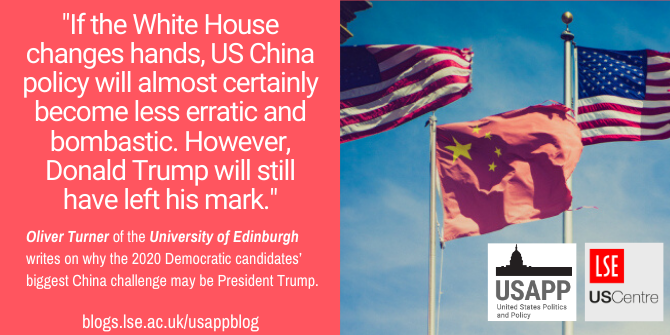 While China has been a consistent target of President Trump’s ire since he became president, discussions about the US’ relationship with the country have featured little in the 2020 election primaries. Oliver Turner looks at how the major Democratic presidential candidates are positioning themselves on China. He writes that no matter their policy plans for the future of the US-China relationship, if they do become president, Trump’s current adversarial tactics will likely cast a long shadow.
While China has been a consistent target of President Trump’s ire since he became president, discussions about the US’ relationship with the country have featured little in the 2020 election primaries. Oliver Turner looks at how the major Democratic presidential candidates are positioning themselves on China. He writes that no matter their policy plans for the future of the US-China relationship, if they do become president, Trump’s current adversarial tactics will likely cast a long shadow.
- This article is part of our Primary Primers series curated by Rob Ledger (Frankfurt Goethe University) and Peter Finn (Kingston University). Ahead of the 2020 election, this series explores key themes, ideas, concepts, procedures and events that shape, affect and define the US presidential primary process. If you are interested in contributing to the series contact Rob Ledger (ledger@em.uni-frankfurt.de) or Peter Finn (p.finn@kingston.ac.uk).
As the competition to become the Democratic Party’s candidate for the 2020 US presidential elections intensifies, where do the leading contenders stand on China and what do their positions say about the possible future direction of the United States’ most consequential bilateral relationship?
So far, and in line with history, the current Primaries have been relatively light on matters of foreign affairs. China has been substantively raised only fleetingly, in reflection of the inconvenient truth that successive US administrations have failed to comprehend exactly how to respond to its rapid modernisation and increasing global influence. The historically unprecedented pace of China’s ‘rise’ continues to raise questions in Washington quicker than they can be answered.
Nevertheless, from 2017 Donald Trump acted comparatively decisively on China, from an explicit dissatisfaction with the records of his presidential predecessors. Obama, Bush, and Clinton all promised to ‘toughen up’ on Beijing before following the path of least resistance and sustaining relations which emphasised the need for China to adhere to the rules and norms of the so-called international community. Trump has engaged with China from the materialist belief that Beijing has long been allowed to cheat a system which no longer serves US interests. His trade war, through which tariffs have been applied to over $500 billion of Chinese goods, is the cornerstone of a newly confrontational, unashamedly-nationalist China policy framed by formal (as with the Trans Pacific Partnership) and informal (as with the East Asia Summit and ASEAN) withdrawal from Asia Pacific multilateralism. How are today’s Democratic candidates positioning themselves as a result?
The candidates and their positions
At the time of writing, former Vice president Joe Biden, Senator Elizabeth Warren, and Senator Bernie Sanders are the clear Democratic frontrunners. These are followed by Mayor Pete Buttigieg, Andrew Yang and former Mayor Michael Bloomberg, among others.
It is clear that each of the candidates feels confident in criticising Trump’s trade war which most Americans believe hurts the United States more than it does China, as well as an unpresidential leadership style perceived negatively among allies. Americans support a firm line on China and the country is seen unfavourably by a majority of the population, but uncertainties about the available rewards from Trumpian internationalism leave vacant political space for an alternative, more effective approach.
Other, more familiar, themes bind the Democratic candidates on China who find a common enemy in Trump. Across the 2019 televised debates, for example, Biden, Buttigieg and Yang (along with Julian Castro and Cory Booker) have all entered their party’s foreign policy safe zone of human rights, arguing that the White House should more actively protest Beijing’s treatment of Uyghurs in Xinjiang and of democracy protesters in Hong Kong. In late 2019 Warren and Sanders signed a bipartisan Act to encourage US action on China’s suppression of its Uyghur population. When asked directly, most candidates also agree that China (alongside Russia) is among the United States’ most pressing geopolitical challenges, but also that a working relationship is key to resolving issues like those presented by North Korea and climate change.
Still, there are not-insignificant disagreements between them.
In May 2019, Joe Biden drew criticism for seeming to dismiss the challenges China poses, arguing “they’re not competition for us”. He expressed similar views while Vice President from 2009-2017. Whether he retains a genuine belief that China poses little competition or whether his priority is to avoid contradicting the line he held in office, we may never know. It is clear however that this approach is something of a gamble.
Appeals to (albeit deeply embedded) notions of American exceptionalism and societal understandings that the US can overcome any global obstacle appear increasingly problematic in 2019. Today, only around half of Americans believe that the US retains the world’s most powerful military. A similar proportion believe that China’s is now the world’s leading economy. Only minorities of younger and Democratic voters believe that the US “stands above all others in the world”. More and more, Americans are being forced to consider their nation’s declining global influence and how to adapt. A rapidly ‘rising’ China, perhaps uniquely, is at the heart of this conundrum.
Biden has also insisted that because either the United States or China will determine the world’s trade rules, Washington must garner international support to win out. In this sense too Biden seeks to build from his record as Vice President, having staunchly supported Obama’s multilateral Trans-Pacific Partnership (TPP) free trade agreement and the wider post-2009 ‘Rebalance’ to Asia which saw Washington reassert security ties with Japan, Australia, South Korea and others. Ultimately, Biden’s position on China is a product of his centrist politics, by endorsing the return of a policy platform pursued under Obama which he considers having been cut short in its prime.

“USA and China Flags in Chinatown” by Nan Palmero is licensed under CC BY 2.0
Learning from his unsuccessful run in the primaries of 2016, Bernie Sanders has been more vocal on foreign affairs this time around, and argues that Biden was “wrong to pretend that China isn’t one of our major economic competitors”. Sanders shares with Biden (and the wider field) a disdain for the character of Trump’s trade war, but separates himself from Biden’s faith in free trade as a proponent of tariffs against China if used in a more “rational” way than under Trump. Sanders’ China policies can be curiously opaque; even what is arguably his flagship foreign policy speech, ‘Building a global democratic movement to counter authoritarianism’, mentions China only in passing.
As one of the most radical candidates, Sanders rejects a return to the business-as-usual on China of the Obama/Biden years, from a foreign policy focus on resolving long-standing problems with the US’ approach to global trade. Sanders is a longstanding critic of Permanent Normal Trade Relations with China, for example (as he was of the TPP), citing adverse impacts on American jobs and industry.
Like Sanders, Elizabeth Warren has said relatively little about China since entering the 2020 Primaries, but has a history of criticising China’s trade practices and retaining the option of tariffs. Warren’s campaign emphasis on the extreme dangers posed by climate change suggest a priority for her would be to bring the US and China, as the world’s largest polluters, into closer alignment with multilateral environmental targets. Pete Buttigieg similarly sees tariffs as justifiable, but argues that the “China challenge is a really serious one” to be dealt with in a more holistic fashion. In honourable mention of the competition’s recent latecomer, Michael Bloomberg’s extensive business interests in China, as well as his suggestion that “Xi Jinping is not a dictator”, may come back to bite him.
What next?
Beijing harbours a traditional preference for Republican over Democratic US presidents, because they tend to have less to say on matters of human rights and democracy promotion abroad, though in truth today’s Chinese Communist Party (CCP) is somewhat ambivalent about exactly who occupies the White House; 21st Century China is now better equipped to weather such economic storms as the one brought by President Trump’s trade war, and to deflect international criticism. Political gains won from the US’ partial withdrawal from Asia Pacific affairs since 2017 means Beijing remains cautious about Trump’s unpredictabilities, but the CCP would be content to see him re-elected.
If the White House changes hands, US China policy will almost certainly become less erratic and bombastic. However, Donald Trump will still have left his mark. For good or bad, Trump has diverged from his presidential predecessors by “standing up” to a China which Americans overwhelmingly interpret as some level of threat in a way he promised to do during his election campaign. Future inaction, even caution and pragmatism, now brings a heightened risk of voter backlash for his successor, and of unfavourable comparisons to a flawed but assertive predecessor who sought to call China out for its transgressions.
One of the more progressive Democratic candidates such as Bernie Sanders, Elizabeth Warren or even Pete Buttigieg would to some degree look to reorient US foreign policy to make assessments of human rights, labour standards and the environment more integral to foreign policy, not least towards China. This would likely see a de-escalation of any ongoing trade war, but with conditions attached. A more centrist, neoliberal Biden administration would in many ways be preferable for China, though a rejuvenated Obama-era ‘Rebalance’ under Biden may be welcomed in Asia and repair damaged alliances in Beijing’s near neighbourhood, helping to restore American leadership.
Ultimately, familiar themes of Democratic discourse have emerged on China in these primaries, notably around the need to defend human rights, American jobs and industry, and the environment. The main difference this time around is that the traditional trope of “toughening up” on China must be adapted, because Trump has played that card but failed to win the game. The opportunities are there for the Democratic candidates, and the eventual nominee, to capitalise on Trump’s experimental China policy. The task for them between now and the election is convincing an increasingly China-sceptic American public that Trump, rather than Beijing, is the biggest problem to resolve.
Please read our comments policy before commenting.
Note: This article gives the views of the author, and not the position of USAPP – American Politics and Policy, nor of the London School of Economics.
Shortened URL for this post: http://bit.ly/2Ylf8Ml
About the author
 Oliver Turner – University of Edinburgh
Oliver Turner – University of Edinburgh
Oliver Turner is a Lecturer in International Relations at the University of Edinburgh. His research on US-China relations and US power and policy in Asia appears in various books, academic journals, news media and other print and online publications.






